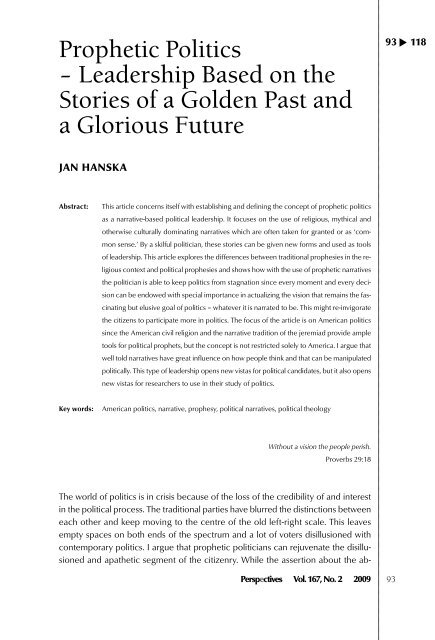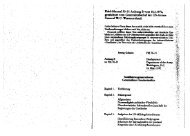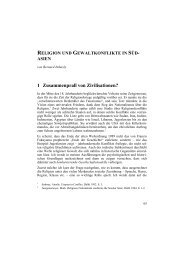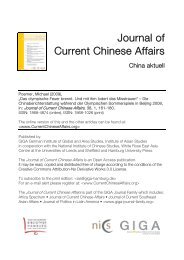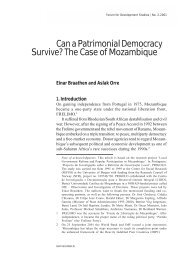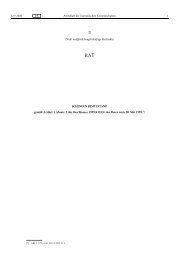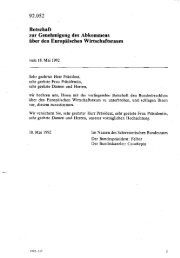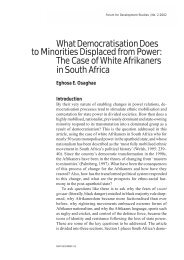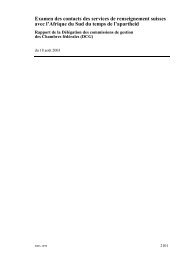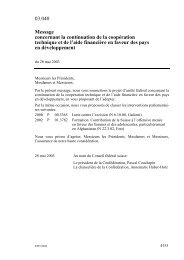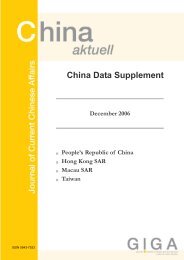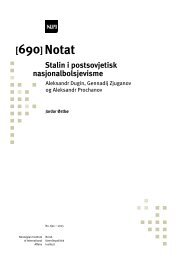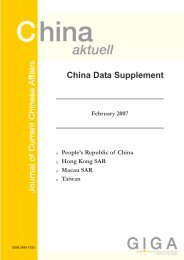Prophetic Politics
Prophetic Politics
Prophetic Politics
Create successful ePaper yourself
Turn your PDF publications into a flip-book with our unique Google optimized e-Paper software.
<strong>Prophetic</strong> <strong>Politics</strong><br />
– Leadership Based on the<br />
Stories of a Golden Past and<br />
a Glorious Future<br />
93 118<br />
▲<br />
JAN HANSKA<br />
Abstract:<br />
This article concerns itself with establishing and defining the concept of prophetic politics<br />
as a narrative-based political leadership. It focuses on the use of religious, mythical and<br />
otherwise culturally dominating narratives which are often taken for granted or as ‘common<br />
sense.’ By a skilful politician, these stories can be given new forms and used as tools<br />
of leadership. This article explores the differences between traditional prophesies in the religious<br />
context and political prophesies and shows how with the use of prophetic narratives<br />
the politician is able to keep politics from stagnation since every moment and every decision<br />
can be endowed with special importance in actualizing the vision that remains the fascinating<br />
but elusive goal of politics – whatever it is narrated to be. This might re-invigorate<br />
the citizens to participate more in politics. The focus of the article is on American politics<br />
since the American civil religion and the narrative tradition of the jeremiad provide ample<br />
tools for political prophets, but the concept is not restricted solely to America. I argue that<br />
well told narratives have great influence on how people think and that can be manipulated<br />
politically. This type of leadership opens new vistas for political candidates, but it also opens<br />
new vistas for researchers to use in their study of politics.<br />
Key words:<br />
American politics, narrative, prophesy, political narratives, political theology<br />
Without a vision the people perish.<br />
Proverbs 29:18<br />
The world of politics is in crisis because of the loss of the credibility of and interest<br />
in the political process. The traditional parties have blurred the distinctions between<br />
each other and keep moving to the centre of the old left-right scale. This leaves<br />
empty spaces on both ends of the spectrum and a lot of voters disillusioned with<br />
contemporary politics. I argue that prophetic politicians can rejuvenate the disillusioned<br />
and apathetic segment of the citizenry. While the assertion about the ab-<br />
Perspectives Vol. 167, No. 2 2009<br />
93
JAN HANSKA<br />
sence of God or even His death shapes modern politics, there arises as a balancing<br />
counterforce a simultaneous religious feeling which only enhances the need for<br />
prophetic voices and tropes in political leadership. It is partially just the religious deprivation<br />
caused by the myth of the death of God which paradoxically creates an<br />
open space and even a demand for prophets. Modern politics are in a way deeply<br />
religious but the mechanisms of this religiosity have been neglected in studies. The<br />
relationship between politics and religion is increasingly important and the dilemma<br />
is how to handle them in study since both influence each other to a point of contamination.<br />
The goal of this article is theoretical and I will elaborate on the idea of prophetic<br />
politics and the role it might actually play in the contemporary politics of our somewhat<br />
secularized world. I will start by contrasting the role of a prophet as it is traditionally<br />
seen in a religious context and the role of a political prophet. In the next<br />
subsection I will further elaborate the role a political prophet needs to play and what<br />
could be the content of his message. I will then continue to describe how a practitioner<br />
of prophetic politics needs to manipulate the concepts of past, present and<br />
future to concoct a suitable blend of temporalities. I will further burrow into the narrative<br />
side of prophesying by describing what types or genres of stories are available<br />
for the prophetic narrator and finally make a case for how prophetic narratives can<br />
provide the building blocks for a new and more inclusive type of civic religion and<br />
show how indeed prophetic narration has been in use for the creation of the American<br />
self-image in the form of a jeremiad. Ultimately I will argue that there is a far<br />
wider field than identity politics where a prophetic style of leadership can be used<br />
for great benefit.<br />
Jim Wallis and David Gutterman have endorsed the concept of prophetic politics<br />
and have claimed that Christian values should play a larger role in American politics.<br />
(Wallis, 2005; Gutterman, 2005) In this essay I shall use their term but try to imbue<br />
it with a slightly different meaning. <strong>Prophetic</strong> politics is often understood only as the<br />
infusion of religion into politics. My intention is to argue that with the use of narratives,<br />
a political leader is able to communicate a grand vision of a glorious future and<br />
at the same time portray each moment as a time of important choices to be made,<br />
and thus he is able to make the events in the political realm more significant and interesting<br />
for the average citizen to participate in them. I am not, however, claiming<br />
that religiosity does not play a huge role in prophetic politics but merely trying to distance<br />
the concept from the more established church religions. I separate the idea<br />
of prophesying from its religious connection vis-ą-vis any particular denomination<br />
and argue that prophetic politics can use the religiosity inbuilt into all of us.<br />
My focal point is the politics of the United States of America because it stands as<br />
the first and foremost of all western nations when it comes to the importance of religion<br />
in the political realm. There is no point in restricting oneself to generally claim-<br />
94 Perspectives Vol. 17, No. 2 2009
PROPHETIC POLITICS<br />
ing that religion plays a role in American politics. Such a claim would be far too universal<br />
and bland. There is a heated and ongoing debate about the wall of separation<br />
between the church and the state. America has long seen itself as a New Israel, a land<br />
specially set aside by Divine Providence and imbued with a Manifest Destiny. The<br />
idea of American exceptionalism still runs amuck in all its world affairs. Forces both<br />
religious and secular try to assert their influences over the public sphere. (Marty,<br />
1984; Kosmin-Lachman, 1993; Curry, 2001; Meacham, 2006) To assert that this religiosity<br />
takes a prophetic shape actually adds something new to the discussion. The<br />
Western system of moral values is to a large degree grounded in the moral norms<br />
of Christianity. Religious values are to be found in practically all levels of political<br />
rhetoric but the use of religious narratives as actual tools of political leadership has<br />
not been researched. The viewpoints of narrative and religo-political studies have<br />
been neglected in studies on American presidency. The president often assumes<br />
the role of a ‘pastor of national faith’. (Marty, 1984) <strong>Prophetic</strong> politicians who choose<br />
this manner of leadership and use religion to their advantage do not necessarily<br />
work towards the realization of Christian good for all people in an altruistic manner.<br />
Leadership is narrated as interpreting God’s will, but God Himself gets somewhat<br />
secularized in this model into the god of the civil religion, which is to a great degree<br />
tainted with purely American values.<br />
I consider prophetic politics to be a form of charismatic political leadership that<br />
focuses on the use of future-oriented storytelling as well as narrating the past differently,<br />
as it is to create in each actual present moment of politicking a moment of<br />
choice, where the decision made will echo unto eternity and completely choose<br />
the direction politics and the country take, either towards Gomorrah or an actualization<br />
of a golden future. For me a prophetic politician is first and foremost a leader<br />
who uses stories and narratives of promise and greatness to contrast the gloomy<br />
present with a future beyond all imagination if only the choices he advocates are<br />
made. He has to be a skilful narrator who can manipulate and exploit a multitude of<br />
the myths, sacred stories or metanarratives that shape our existence and identity for<br />
his political purposes. One of these grand narratives, which still plays a large role for<br />
us, is religion, and if he chooses not to use religion, he has to transplant the religious<br />
faith to something else – for example, patriotism. <strong>Prophetic</strong> politics is about a vision<br />
of change and acting according to that vision. It is my intention to argue that political<br />
leadership can be rested on a prophetic politician’s ability to communicate the<br />
values of Americans and that his main vessel of communication is telling stories and<br />
becoming a narrator. The traditional image of a politician is like that of a manager,<br />
a gentleman in a fitting suit with thoughts formulated so as not to arouse any passions,<br />
pro or con, in anyone. He and his kind are the ‘gray eminences’ in politics, men<br />
who have adapted to the political system to such a degree that they seem to have<br />
become its fleshy manifestations. The prophetic politician wants to separate himself<br />
Perspectives Vol. 167, No. 2 2009<br />
95
JAN HANSKA<br />
from the way politics are usually conducted and the established norms within it and<br />
to portray himself as an outsider to politics with an intention to change the system<br />
and to arouse passions in the citizenry.<br />
One central concept in my thinking of narratives which occurs often in the essay<br />
is ‘storyworld’. The concept was invented and elaborated by David Herman but<br />
there has indeed evolved an actual field of study among narrative theorists around<br />
the ‘possible worlds’ concept, and the terminology is very colorful, ranging from<br />
‘storyrealm’ to ‘taleworld.’ (Genette, 1980; Todorov, 1981; Ryan, 1991; Palmer, 2004;<br />
Herman, 2002) It refers to the ability of storytelling to create alternative worlds and<br />
transport the reader into them. In the creation of these storyworlds, both the narrator<br />
and the reader play an active role. A storyworld has its own natural laws, its own<br />
chronology, and every aspect of the world is a narrative construction and must follow<br />
the logic of the story itself. The more elaborate and fulsome in detail the narration<br />
is, the more complete will the resulting storyworld be. For political purposes<br />
the plausibility of a storyworld is essential because once it has been structured, certain<br />
elements that occur in the ‘real world’ of politics can be excluded from the storyworld,<br />
which is constantly being recreated with repetitive tellings and narrations.<br />
Emile Durkheim noted that there is an often overlooked element of religion: its<br />
recreational and aesthetic element. Religious dramatic performances use the same<br />
techniques as drama and ‘they make men forget the real world so as to transport<br />
them into another where imagination is more at home.’ (1995: 384) Durkheim seems<br />
to assert that there are storyworlds which can be entered by the means of religion.<br />
Thus religious storytelling, whether civil or not, opens up new vistas in the form of<br />
storyworlds. A prophetic politician needs to be aware of this and consciously create<br />
storyworlds with the help of civil religion to allow his people to escape the harsh realities<br />
of everyday life into these worlds. It is well-known that mythology has connections<br />
with poetry and for this reason mythology has often been situated outside<br />
religion. For Durkheim, nevertheless, ‘the truth is that there is a poetry inherent in<br />
all religion.’ (1995: 386)<br />
THE ROLE OF THE PROPHET AND THE<br />
CONTENTS OF HIS MESSAGE<br />
Max Weber wrote about ‘charismatic leadership’ and claimed that this can be exercised<br />
by ‘the prophet – or in the field of politics – by the elected war lord, the<br />
plebiscitarian ruler, the great demagogue, or the party leader.’ (1994: 312) It is not<br />
a big step to blend the boundary between religion and politics as they are already<br />
intermingled in the American context and they both employ the role of the prophet<br />
in politics as well. Weber also claims that this type of leader is ‘personally recognized<br />
as the innerly “called” leader of men. Men do not obey him by virtue of tradition<br />
or statute, but because they believe in him.’ (1959: 79) Even Weber himself<br />
96 Perspectives Vol. 17, No. 2 2009
PROPHETIC POLITICS<br />
talks of charisma as an ‘extraordinary personal gift or grace’, in terms which are inherently<br />
religious. So what Weber did was bring the prophet into the more secular<br />
or profane sphere of politics, and my purpose is to reverse the process and de-secularize<br />
the charismatic politician back into his prophetic role and reconnect him<br />
with religion and particularly civic religion.<br />
I have chosen to use the label ‘prophet’ even though a different label like ‘oracle’,<br />
for example, would suffice almost as well. But an oracle is only someone who gives<br />
consult to the leader while the prophet takes upon himself the function of the leader<br />
of his people. Concerning the status of the prophetic politician, Northrop Frye stated<br />
that<br />
It is clear that the poet who sings about gods is often considered to be singing<br />
as one, or as an instrument of one. His social function is that of an inspired oracle.<br />
[…] The poet’s visionary function, his proper work as a poet, is on the plane<br />
to reveal the god for whom he speaks. This usually means that he reveals the<br />
god’s will in connection with a specific occasion […] but in time the god in him<br />
reveals his nature and history as well as his will, and so a larger pattern of myth<br />
and ritual is built up. (1957: 55)<br />
The poet-politician becomes connected to the god he narrates about, whichever it<br />
may be, and if he is able to use the story to his maximum benefit, some of the divinity<br />
will rub off on him as well. But this is easier said than done.<br />
America traditionally fears demigods and dictators who have charisma, divine<br />
favour, or grace granted to them by God. ‘American democracy is embarrassed in<br />
the charismatic presence.’ (Boorstin, 1962: 50) On the other hand Paul D. Erickson<br />
asserts that the romanticization of American history is an unconscious phenomenon<br />
and that there is a ‘mysterious impulse’ similar to those of the ancient societies which<br />
turns history into folklore and then into mythological religions to transform American<br />
human leaders into ‘demigods.’ (1985: 3) While his choice of terms is a little<br />
strong, the point still rings true. This is evident in the process where George Washington<br />
has been transformed from an able statesman and administrator into ‘the<br />
quasi-divine Father of Our Country.’ (Ibid.) Erickson further notes that this ‘fictive<br />
deification’ is still present in the way Americans tend to view their president. As soon<br />
as a person gets elected, he somehow rises as a chief executive above mortality into<br />
‘a state of superhumanity’ and thus every president since the first has found himself<br />
defined by this popular notion of his symbolic role. (Ibid.) This places new demands<br />
on the political prophet to be. He has to narrate his identity in such a manner so<br />
that at the same time he would be the messenger of God to the people and the<br />
messenger of the people to the powers that be. He must be a common man but at<br />
the same time possess a touch of the divine. He has to create a role of being among<br />
Perspectives Vol. 167, No. 2 2009<br />
97
JAN HANSKA<br />
the people and working for them as selflessly as he works for God and stand outside<br />
the political work of governing the people. A political prophet must be a champion<br />
of the people and a champion of God at the same time, and narrating such an identity,<br />
in which he serves two masters, is a demanding task.<br />
While Biblical Prophets often spoke in allegories which are sometimes hard to<br />
grasp at least in retrospect, the modern political prophet needs to use clear language<br />
in his message. The modern world is often difficult to understand because of<br />
its complexity, and one of the reasons why political narratives are useful is that they<br />
can simplify the world. The use of allegories just as certainly has its place in the modern<br />
prophets’ repertoires as well, but essentially the vision must be communicated<br />
in a form ‘everyman’ can understand. Biblical prophets often went to the desert<br />
without food or drink and returned with their vision in a state more delirious than not.<br />
William James argues that religious leaders have been liable to abnormal psychological<br />
states and that their lives have been characterized by inner conflicts, trances,<br />
hearing voices, and seeing visions. In general they exhibited such traits as those that<br />
are commonly considered to be pathological, but actually, it is precisely these pathological<br />
characteristics that have advanced their rise to the position of a religious authority.<br />
(1981: 14) In contrast, the modern prophetic figure must be constantly<br />
attuned to the changes in the political world and have his finger on the pulse of<br />
events. His vision must be coherent and not give the impression that it originates<br />
from hallucinations. Times have changed and along with them, the requirements of<br />
a prophetic message changed as well. While there undoubtedly is a niche for rambling<br />
‘prophets’ that speak in tongues within some churches of the more evangelical<br />
denominations, the political prophet needs to be clear and coherent in his<br />
storytelling. All too often, even today, the figure of a prophet is seen as needing to<br />
‘have hallucinatory visions or dreams (for them as vividly real as any physical experience)<br />
in which they directly confront the deity.’ (McLoughlin, 1978: 16)<br />
The traditional prophets truly believed they had seen their respective gods or<br />
heard them declare themselves. These men had a strong sense of inspiration, in this<br />
sense meaning that they acted as vessels for a higher power. This higher power entered<br />
them with great and irresistible force, which determined the point of view the<br />
prophet had concerning his contemporary issues. This is a reason why Old Testament<br />
prophets uttered their prophecies as if God himself was speaking through their<br />
mouths. James argues that the characteristic of a prophet was that he spoke with the<br />
authority of God, declaring himself what God wanted to say (‘Thus sayeth the Lord<br />
God.’) (James, 1981: 340). Prophets and the content of prophesies have changed<br />
and the prophets of our times cannot show signs of emotional, spiritual or mental<br />
disturbances, but they have to deliver their message in a relatively rational manner<br />
and terminology and even shy away from claiming to speak for God in the words of<br />
God. The prophetic leader (for example, a politician), with the form and content of<br />
98 Perspectives Vol. 17, No. 2 2009
PROPHETIC POLITICS<br />
his prophesying (that is, with a narrative), can only evoke the metatexts and metanarratives<br />
of prophesy and guide his or her story recipients to associate his/her narrative<br />
with the prophetic genre.<br />
When one considers the idea in relation to American prophets, it is necessary to<br />
keep in mind the American tradition of laymen working as preachers, organizing revivals<br />
and generally spreading the Gospel. Indeed, most of the very efficient revivalists<br />
were not clergy, but average people. There was a deep dislike of the<br />
separation of clergy and laity, especially in the cases that involved the composition<br />
of the ministry. (Herberg, 1960: 106) Revivalism is not unique to the Americans but<br />
its popularity and power owed much to the fact that it depended on public speech<br />
in plain language and extemporaneous speech. (Boorstin, 1965: 318) Religion and<br />
the word of God were democratized in America. ‘If God spoke through the common<br />
man, the voice of the people was the voice of God.’ (McLoughlin, 1978: 86) This is<br />
a two-sided argument; anybody, layman or priest, can adopt the prophetic role without<br />
connection to the church but additionally, the politician can glean the word of<br />
God by listening to the people.<br />
De Tocqueville writes that it is not necessary for God himself to speak in order for<br />
the people to discover the true signs of His will. The examination of the ‘usual course<br />
of nature and the continuous tendency of the events’ (2000: 6–7) is enough to reveal<br />
God’s will. The important point is that the prophet does not need to hear the<br />
voice of God to interpret it. He can use his powers of deduction and by close observation<br />
of the world around him mentally compose the picture of what God’s plan<br />
includes. The vision of the political prophet has to be narrated so as to derive from<br />
an intelligent interpretation of God’s will. This is a more suitable method of prophesying<br />
to our contemporary conjunction. Rationality or at least the appearance of<br />
it is crucial in carrying out policies and one of the greatest challenges of prophetic<br />
politics is to combine the notions of God’s will or plan with such rational guidelines<br />
of policy that even an atheist could accept the reasoning behind them. But if the divine<br />
inspiration is depicted to have been communicated by means of reason instead<br />
of ‘a voice from the burning bush’, the prophetic policymaking creates a narrative<br />
which is more inclusive in its nature.<br />
Prophets often arise from the margins of society and Gutterman sees even the<br />
Biblical prophets as outsiders of their societies and cultural contexts in a position<br />
where they can criticize the social order and attempt to further equality and justice.<br />
(Gutterman, 2005: 43) I argue that the prophet can be a central figure of the society<br />
as well if he chooses to only narratively situate himself outside the realm of politics.<br />
In fact the most interesting political prophets are those who have an authority<br />
bestowed on them by their elevated socio-political status. This gives them a dominant<br />
narrator’s position and helps the process in which their stories cue their listeners<br />
more efficiently to engage in their storyworlds. A successful prophet is a leader<br />
Perspectives Vol. 167, No. 2 2009<br />
99
JAN HANSKA<br />
in some sense of the word. He may not be a political or military leader, but at least<br />
he is a moral authority figure with the power to influence the thinking of others and<br />
play a prominent part in the creation of common values. A prophet truly becomes<br />
one only when he is able to distinguish himself and attain a leadership position. An<br />
unsuccessful prophet is just another grumbler in the opposition and may even be<br />
only a village idiot of the modern age.<br />
It is specifically those times when the existence of the entire society is threatened<br />
that call for prophetic political figures to arise within the ranks of the highest officeholders.<br />
Prophets from the margins of society are not sufficient to project the society<br />
as a whole and the leadership must assume a new role. The need for strong, prophetic<br />
figures to express strong visions to rally the people is important. Both Gutterman and<br />
Wallis see the birth of prophetic figures entwined with times of crisis so that it would<br />
be impossible for prophetic figures to arise during times of societal harmony and wellbeing.<br />
(2005) It is, nevertheless, possible to ‘create a crisis’ narratively. While domestic<br />
and social problems have not been in short supply in the past decades, the<br />
presidents have been able to narrate situations of crisis in foreign policy and at the<br />
same time downplay pressing problems on the domestic front. Once the political<br />
prophet has created a detailed and plausible storyworld to attract listeners and get<br />
them to allow themselves to be transported away from the immanent world and get<br />
carried along with the political story, it is relatively easy for him to assume the role of<br />
a super-narrator in the entire field of politics and gain the power to create or hide a crisis.<br />
This ability is only within the reach of particularly gifted narrators.<br />
Especially during the recent years in American politics, the Republicans have exploited<br />
religion, and the Democrats have been afraid to use it at all. (Wallis, 2005;<br />
Lakoff, 1995) Ronald Reagan, for example, entwined religious values into his storyworld<br />
in a manner that could be used to support almost every political decision,<br />
and the failure of Democrats to include religion in their counter-narratives allowed<br />
Reagan a free playground with religious narratives and a monopoly in prophesying.<br />
More than one prophetic political figure is needed at the same time to avoid the<br />
misuse of religion. The lack of a powerful and compatible counter-narrative enables<br />
the vision of the prophetic politician to be able to strive to establish his story as a<br />
master-narrative. Gutterman distinguishes stories from ideology by claiming that a<br />
narrative enters the world and lives as one among many while ideology seeks to establish<br />
itself as uncontested, as the sole story which masters the meaning of states,<br />
actions and events and closes them from reinterpretation. (2005; 44) But when stories<br />
are used to spread and communicate ideologies and modes of thinking, storytelling<br />
becomes a practice that seeks domination in the political arena. The more<br />
proclamatory storytelling in politics is, the more prophetic politics become. A storyteller<br />
definitely is not a person who wants to shout his stories into a dark void. He<br />
always seeks some kind of response, some effect. He wants to be heard, noted and<br />
100 Perspectives Vol. 17, No. 2 2009
PROPHETIC POLITICS<br />
acted in accordance with. To be truly effective a political prophecy cannot and must<br />
not enable contesting narratives to be heard. It is the primary object of prophetic politics<br />
to prevent the story recipients from getting the impression that there would<br />
even exist another way of depicting political reality. Unless other charismatic figures<br />
are offered as an option, even a feeble prophet gains acceptance of his vision if it is<br />
able to give the impression of being grounded well enough in common values. Faith<br />
certainly has inspired American politicians from Abraham Lincoln to George W.<br />
Bush but in most cases the inspiration derives from its use as a weapon in politics instead<br />
of it being something that reforms the outcomes of political decision-making.<br />
Gutterman focuses his attention on the actual mechanisms of how prophesies are<br />
communicated and he sees ‘sacred stories’ as the foremost vessels of spreading the<br />
vision. For him prophetic politics simply means that political figures or institutions<br />
base their identities in certain Biblical narratives which enable the formation of relatively<br />
stable political identities and visions. (2005) I argue that any story which is foundational<br />
to a given culture can be viewed as sacred. These sacred stories are so<br />
sedimented into a certain cultural context that they are able to mould the culture and<br />
the vision of politics by setting limits to the more mundane stories that can be told<br />
about related subjects. There is not necessarily anything religious in these stories, but<br />
the term is used to imply their unquestionable status in the given culture. They themselves<br />
create laws of telling within their respective storyworlds by establishing themselves<br />
as ‘common sense’ or simply almost eternal truths. There can be many different<br />
sacred stories and they may differ from one period of time to another. (Gutterman,<br />
2005: 10–15, 30–34) As Corrine Squire argues, master narratives are ‘always less stable<br />
and unified than they appear, more susceptible to fracture and diversion.’ (Cit. Andrews,<br />
2004: 4–5) Even the type of master narrative which practically seems to have<br />
been engraved in stone is teetering on a tightrope. This creates the constant need for<br />
a prophetic politician to rearticulate, reshape and retell his narratives so that they are<br />
more likely to dominate the discourse. Northrop Frye writes:<br />
It is obvious […] that one major source of order in society is an established pattern<br />
of words. In religion this may be a scripture, a liturgy, or a creed; in politics<br />
it may be a written constitution or a set of ideological directives […] Such verbal<br />
patterns may remain fixed for centuries: the meanings attached to them will<br />
change out of all recognition in that time, but the feeling that the verbal structure<br />
must remain unchanged, and the consequent necessity of reinterpreting<br />
it to suit the changes of history, bring the operations of criticism into the center<br />
of society. (Frye, 1957: 349)<br />
Frye allows the sacred story the chance to change its meanings and leave itself open<br />
for reinterpretations. The Constitution and other sacred texts and stories from the<br />
Perspectives Vol. 167, No. 2 2009<br />
101
JAN HANSKA<br />
American history can be taken by a prophetic politician and reshaped in such a way<br />
that their verbal structure seems unchanged but the original sacred stories are modified<br />
into new ones. <strong>Prophetic</strong> politicians can evoke sacred stories from the collective<br />
memory of the nation and give them new meanings and simultaneously draft<br />
new storyworlds. The use of quotes and words of others takes nothing away from the<br />
originality of a prophetic politician.<br />
The prophetic politician can describe reality as vastly different from the way it is<br />
usually conceived to be. Aristotle wrote that ‘If it be objected to the poet that he<br />
has not represented things conformably to truth, he may answer that he has represented<br />
them as they should be.’ (1940: 52) Ochs and Capps argue that a teller may<br />
sequence his/her narratives as experiences which are situated in an ‘unrealized past<br />
as well as unrealized present and future realms.’ (2001: 165) The teller can therefore<br />
naturally sequence a chain of events that has never happened, nor is likely to ever<br />
happen, but by taking a moral stance or some other viewpoint, he or she claims that<br />
it should or could have happened either earlier or after the narration. The difference<br />
between this type of narrative and a prophetic narrative actualizes itself in the future<br />
only if the event sequence does take place. If the unrealized future becomes realized,<br />
that is, things happen in the way the teller describes, we retrospectively label the<br />
narrative as a prophecy. But essentially prophesy is not future-telling but articulating<br />
moral truths so that the prophet diagnoses the problems of the present and provides<br />
a solution to contemporary social dilemmas.<br />
The politically important aspect of prophesies is the actions and functions during<br />
the actual time of the prophecy itself. The strength of the prophecy manifests itself<br />
in its short-term results and in changing the present to inflict the future. Visions are<br />
used to push through developments in the political decision making and as political<br />
tools to gain more down-to-earth benefits. Thus, paradoxically, important visions of<br />
the distant future actualize themselves almost simultaneously with the actual utterance<br />
of the prophecy. Vision is just a mirage beyond the horizon, but its effects echo<br />
in the present. A prophet can portray his vision but it is often totally unattainable in<br />
the foreseeable future, and thus the importance lies in the ways in which the prophet<br />
can narratively seduce the citizenry to follow his example, fulfil his immediate political<br />
goals and thus bring the actualization of his political vision infinitesimally closer.<br />
Visions and prophesies are ultimately about the future but the actual policymaking<br />
takes place in the present. The impact of prophetic politics needs to be felt in the present<br />
for it to be effective, and credit for long term benefits should be left for the subsequent<br />
historians to give.<br />
What then should be the content of a true political prophecy? Almost any kind of<br />
radical change of values or transformation of the status quo could fit into the concept.<br />
Only when the ‘bad’ policies of the past are brought to light, a new, different<br />
option which leads to better times is given as the alternative, and the political pro-<br />
102 Perspectives Vol. 17, No. 2 2009
PROPHETIC POLITICS<br />
cess of giving a choice or at least an illusion of a choice to the citizenry takes place<br />
can the message be considered prophetic. In the Bible most of the prophets set out<br />
to correct social injustices or attack the faithless, but these are not necessarily the<br />
only acceptable goals for visionaries. Using the traditional wrongs to correct and visions<br />
makes the actual prophesying easier because the listener recognizes the story<br />
as belonging to a prophetic speech genre almost immediately. This is because it is<br />
essentially based on the same proto-stories, meta-narratives, sacred stories or myths<br />
as the ‘original’ prophesies. These sacred stories are important because a narrative<br />
has to resonate with other similar narratives in the mind of the listener/reader to get<br />
recognized as belonging to the same genre. If the political prophecy does not cue<br />
a citizen to identify it as a prophecy, some of its ability to create a preferred type of<br />
a storyworld is lost.<br />
THE MANIPULATION OF TIME IN PROPHESIES<br />
Wallace Martin makes a crucial mistake when he claims that ‘narratives concern<br />
the past. […] Whereas most sciences involve prediction, narrative involves retrodiction.’<br />
(1987: 74) Martin is stuck too much with the historical conception of a<br />
narrative. The predictive side of narratives is and, for effectiveness, should always<br />
be present in prophetic politics. Naturally one main focal point of a prophetic narrative<br />
is and has to be in the past in order to interpret the past in the most suitable<br />
manner, but to lead effectively, the sights of the narration must be focused into the<br />
future. Narrative leadership is future-oriented, but it has its roots in the past and<br />
in the process of storytelling, both the past and the future become very fluid concepts<br />
indeed for the benefit of the narrator. The past is like a vast array of stories,<br />
a bag the politician can dip into according to his will and bring up features that<br />
support his storytelling and his storyworld, and all else can be omitted and silenced.<br />
Our self-conception even as a society can be achieved through the use of narrative<br />
configuration, and the existence can be made whole by understanding it as a<br />
single unfolding and developing story. In the words of Donald E. Polkinghorne the<br />
self ‘is not a static thing nor a substance, but a configuring of personal events into a<br />
historical unity which includes not only what one has been but also anticipations of<br />
what one will be.’ (1986: 150) One of the key features the prophet must have is the<br />
ability to provide the people he is leading with a unified view of themselves and<br />
their existence and an idea of a joint purpose. This requires the communicated message<br />
to include historical events in the configuration of the future. Both the past and,<br />
especially, the future must be inherent in the prophetic message. There is no vision<br />
of the future that is separated from the past and present, but the future must be narratively<br />
created (with an almost solid existence instead of being merely one possible<br />
idea that might actualize) by tying together a continuous teleological timeline<br />
Perspectives Vol. 167, No. 2 2009<br />
103
JAN HANSKA<br />
that connects the past to the present and the choices that must be made to follow<br />
‘on the right path’ into the ‘right’ future.<br />
We live out our lives, both individually and in our relationships with each other,<br />
in the light of certain conceptions of a possible shared future, a future in which<br />
certain possibilities beckon us forward and others repel us, some seem already<br />
foreclosed and others perhaps inevitable. There is no present which is not informed<br />
by some image of some future and an image of the future which always<br />
presents itself in the form of a telos – or of a variety of ends or goals –<br />
towards which we are either moving or failing to move in the present. (MacIntyre,<br />
1984: 215–216)<br />
How could one better put in writing the essence of prophetic politics? The most important<br />
aim of narrative prophetic politics is to communicate to the people a vision<br />
of the future in order to ‘beckon them forward’ and at the same time to warn them<br />
of the alternative future which will become inevitable if the narrated politics are not<br />
followed. The citizenry needs to be convinced with credible and skilled storytelling<br />
that the objectives of the politician are precisely the same as its own or the ‘beckoning<br />
future’ the individual has in mind needs to be transplanted with the prophetic<br />
vision of the future the politician narrates. As Uri Margolin notes, we are continuously<br />
surrounded by prognostications concerning the future. Reality is envisioned as a<br />
space of at least partially indeterminate potentialities existing around us, or in which<br />
we exist, at any given moment. Futurologists of all types, military, economic, social<br />
or political, forecast for us their own respective versions of the future and out of this<br />
battle of contrasted storyworlds, the prophetic politician must be able to get his<br />
voice heard and his story believed in. (Margolin, 1999: 163–164)<br />
The prophet is ‘a storyteller, situated between a people’s past and future, [and] the<br />
prophetic figure takes on the role of defining the identity and vision of a community<br />
or nation. Interpreting and retelling the history of a people, the prophet articulates<br />
the crisis of the present moment and the promise as well as the dangers of the future.’<br />
(Gutterman, 2005: 49) The expression ‘situated between past and future’ is crucial.<br />
The prophetic political storyteller should not live in the present since the present<br />
is ambivalent. Each tick of the clock transforms the future into the present only to<br />
move it to the past. The present is just a fleeting moment when political decisions<br />
have to be made and each of these moments enables a different future to come<br />
into existence. The present is always a moment of instantaneous choices, and the<br />
eyes of the prophet look only to the past for guidance and to the future to identify<br />
things which he perceives as threatening to the fulfilment of his vision or rather the<br />
Divine Plan he communicates. ‘The prophet is thus poised to charge listeners with<br />
a mission to transform the world.’ (Gutterman, 2005: 50)<br />
104 Perspectives Vol. 17, No. 2 2009
PROPHETIC POLITICS<br />
Despite the fact that prophetic narratives are by definition future-oriented, they<br />
must deal with the past as well. Frank Kermode argued that narrative gathers up<br />
meaningful episodes from the flow of time and that the methods used in this process<br />
are cultural. In Western culture these methods continue to be drawn from the<br />
Biblical notion of temporality, which is not an uninterrupted flow of chronos-time, but<br />
broken into moments of kairos which are imbued with special significance. The beginning<br />
of a kairos moment is identified as an event that makes a difference in the<br />
life experienced and the ending comes about with a resolution that returns the life<br />
to routine. (Polkinghorne, 1986: 79) One can plausibly therefore argue that the entire<br />
narrative takes place in kairos time because of the need, which was emphasized<br />
by Jerome Bruner, to breach the canonicity and thus create something worth telling.<br />
(1986) Kairos time is just as crucial to prophesying. It is all about seizing the appropriate<br />
moment of chronological time to make fundamental choices. The politician<br />
lays a special emphasis on the need to make decisions and to follow his vision so that<br />
the values in the heart of his narrative would actualize. The kronos-time is only an illusion<br />
in prophetic politics, since precisely every moment is turned into a kairos-moment<br />
and the routine does not return since there is always a new decision to be<br />
made. This leaping from decision to decision and continuously living on the culmination<br />
points of kairos-time allows the prophetic politician to avoid stagnation. The<br />
progress which stands in the focal point of his vision is continuous if, and only if, decisions<br />
favourable to him are made in each moment.<br />
The world-creation in prophetic politics often happens through the process of reconstruction<br />
of memories. The object of political theory is not so much to reform our<br />
morals as it is to reform our memories. It is through the reshaping of memories that<br />
our morals are reformed. (Gutterman, 2005: 33) One of the important things in the<br />
structures of prophetic political narratives is their orientation towards time and history.<br />
In addition to mediating between God and his chosen people, the prophet<br />
must act as a temporal mediator as well. In each of his retellings of any sacred story,<br />
the prophetic politician alters the shifting relationships between the past, the present<br />
and the future. (Ibid.: 14) Time cannot be still, temporality must remain fuzzy, different<br />
moments of kronos-time must overlap, and the flow of time must become erratic<br />
as the future and the past are in a flux and blend together. The prophet must<br />
orient himself in time and bind the kronos time into his story, but at the same time<br />
he often distorts the idea of linear time when he seeks to narratively change the history<br />
in order to alter the future. The past as it is perceived has led to the present, and<br />
the linearity of time and the notion of causality allow the prophet to decipher the<br />
meanings of past events and predict a future according to the laws of causality.<br />
Should he choose to do so, he can alter the past by narrating it in a different manner<br />
and thus the actions of the past lead to a different present and this allows the<br />
prophet to give alternative meanings to the states, events and actions in his present.<br />
Perspectives Vol. 167, No. 2 2009<br />
105
JAN HANSKA<br />
Because the past is altered, the present can be described as something entirely different<br />
from the common description. Thus the prophetic politician is able to create<br />
crises even when they do not exist, and this ability to portray the society as facing a<br />
crisis at any chosen moment is crucial to prophetic politics since it acts as a way of<br />
avoiding situations of political or social stasis or stagnation. The idea of causality<br />
also allows the prophetic politician to describe and narrate a plausible future. Since<br />
he has already altered the past to create a certain kind of present, it is easy to offer<br />
solutions and predict their eventual outcomes (these predictions can involve both<br />
failures in realizing his vision and those occasions when the solutions offered are<br />
accepted and the golden future comes one step closer). As Catherine Kohler Riessman<br />
argues, ‘the “truths” of narrative accounts are not in their faithful representations<br />
of a past world, but in the shifting connections they forge among past, present and<br />
future’ (2004: 35). All narrators interpret the past in their stories rather than producing<br />
the past as it was. <strong>Prophetic</strong> storytelling is simultaneously self-making and<br />
world-making activity where the identity and context of the past, present and future<br />
are delineated and a unified conception of reality is projected into the world. (Gutterman,<br />
2005: 22) <strong>Politics</strong> that concern today must not limit themselves to making<br />
today better but essentially they must create, primarily narratively, but also in a more<br />
concrete manner, the future. Former Secretary of State Alexander M. Haig argued<br />
that ‘to make foreign policy for a powerful state is, to a degree, to make the future.’<br />
(1984: 13) When a narrator foreshadows his narrative, he considers ‘the present not<br />
for itself, but as a harbinger of an already determined future.’ (Ochs-Capps, 2001:<br />
5) The narrator presents events and casts characters in such a way that he gives the<br />
impression of knowing what the future will hold. The past is merely a waypoint on<br />
the teleological path into predetermined events if the right political choice or decision<br />
is made.<br />
Every moment is a crossroads where the way of the vision leads to a glorious future<br />
and the other way leads to a despair or gloom of some sort. For the object of<br />
all politics, the citizen, this process of choosing manifests itself most clearly in the<br />
form of elections. The political parlance prior to elections is full of promises and visions<br />
of a better future if one particular politician is chosen. Elections are full of hollow<br />
words and promises to be broken, but relatively seldom are there actual<br />
visionary prophecies of better times to come. It is hard to define whether this or that<br />
political promise to the electorate is prophetic or not since the scale is gradual. Everyday<br />
promises of ‘a chicken in every pot’ or reducing unemployment are not much<br />
as prophesies go. But visioning, for example, a future where America ‘shines as a<br />
beacon of hope to all those who long for freedom and a better world’ (Reagan 4.<br />
11. 1983) is communicating a prophecy. The glorious future must be narrated to always<br />
be just within and just out of reach at the same time. A view of the future of<br />
America in which it might potentially become the true fulfillment of the Kingdom of<br />
106 Perspectives Vol. 17, No. 2 2009
PROPHETIC POLITICS<br />
God on earth one day is a powerful motivator, since it remains in front of the citizenry,<br />
always beckoning, always calling the people to strive further towards a golden<br />
future while at the same time always remaining unattainable like a mirage. A true<br />
prophetic vision in politics must never be actualized because that would be the point<br />
where progress terminates. <strong>Politics</strong> cannot allow itself to ever reach the perfect society<br />
it strives for. Should it happen that prophetic politics would promise something<br />
tangible, palpable and above all measurable and fail to deliver on that promise, the<br />
guilt of failure would come into existence and would have to be expiated or removed.<br />
This expiation would be a complex process and a prophetic politician is indeed<br />
able to make it unnecessary. As long as his promises of deliverance are vague<br />
and ambivalent enough so that there can be no claims as to them not having come<br />
true, the need for expiation does not arise. As Boorstin claims, vagueness is a great<br />
resource of America because uncertainties are the producers of optimism and energy.<br />
‘If other nations had been held together by common certainties, Americans<br />
were being united by a common vagueness.’ (1965: 219) De Tocqueville writes that<br />
in religion, everything is ‘classified, coordinated, foreseen, decided in advance’ and<br />
in politics, it is ‘agitated, contested, uncertain.’ (2000: 43) The ambiguousness of<br />
the political world can be eradicated by an infusion of religion. Uncertain issues can<br />
be endowed with a semblance of certainty derived from the divine plan according<br />
to which things must ultimately go. Therefore prophetic politics makes it possible for<br />
the unstable realm of politics to seem and feel more stable and thus to offer more<br />
of a sense of security for the people. The vagueness still remains, since prophetic politics<br />
only seems to offer certainties by the leadership, but this is an illusion. Boorstin<br />
also argues that the ‘very uncertainties which inspired and exhilarated Americans<br />
also made them feel a special need of reassurance. The more uncertain its destiny,<br />
the more necessary to declare it “manifest.”’ (Ibid.: 274) It is the vagueness and not<br />
the ‘manifestness’ of the national destiny which is the great power of American national<br />
and political life.<br />
THE GENRE OF PROPHETIC NARRATION<br />
A similar vagueness is a characteristic of the genres the prophetic political narratives<br />
belong to. Ambiguousness situates the story between genres. Frye writes that<br />
‘the tragic hero is typically on top of the wheel of fortune, halfway between human<br />
society on the ground and the something greater in the sky. Prometheus, Adam,<br />
and Christ hang between heaven and earth, between a world of paradisical freedom<br />
and the world of bondage.’ (1957: 207) This metaphor of a wheel of fortune is<br />
fitting for prophetic politics. At the top the wheel is able to turn either way once it<br />
reaches the perilous equilibrium. The prophetic politician as a narrator can portray<br />
each moment as if the society were precariously balanced at the top. The citizenry<br />
is cast as the machinery which spins the wheel in either direction by making right or<br />
Perspectives Vol. 167, No. 2 2009<br />
107
JAN HANSKA<br />
wrong choices. At the same time the genre of the story itself is undecided. With the<br />
wrong decision, the story may turn out to follow the characteristic path of a tragic<br />
storyline, where the hero, America, will have an eventual downfall. If the right choice<br />
is made, the story continues as a romance and the wheel merely gains more momentum<br />
towards the future. In prophetic politics the story told has to be left open<br />
for changes of direction and at the same time for changes of the genre itself. That<br />
is why the peaceful fall of the Soviet Union was open for a depiction following the<br />
storyline characteristics of a comedy. Had there been a nuclear war and America had<br />
survived, then the story would have been a romance. Had America deteriorated instead<br />
of the Soviet Union, the story could have been told as a tragedy, where some<br />
flaw brought forth the downfall of the hero. <strong>Prophetic</strong> policymaking has to tell a network<br />
of stories which fluctuate between genres.<br />
It is tempting to view prophecy as merely a tale of a bright future. If we choose to<br />
see it as a tale, we can employ Vladimir Propp’s research. One thing that fits within<br />
the American context is the possible lack of helpers to the hero in the dramatis personae.<br />
The hero, who is his own helper, then takes over the functions and attributes<br />
of the helper, of which one of the most important is ‘prophetic wisdom [...] When a<br />
helper is absent from a tale, this quality is transferred to the hero. The result is the<br />
appearance of the prophetic hero.’ (Propp, 1968: 83) Very suitably for the American<br />
mind-cast, the hero is a self-sufficient maker of his own fortune with the aid of his wisdom,<br />
which, despite its prophetic quality, is the ‘common’ wisdom. Since there is no<br />
one to help America, the DIY-attitude of the American way of life is given free hands<br />
but actually the role of the ‘hero’ changes as well. Since there is no prophetic and<br />
external advice available, the American type of hero will himself gain the ability to<br />
connect with the gods and act both as the messenger of a higher will and a tool for<br />
carrying it out. This type of story can be best employed in a situation of crisis; the<br />
worse the situation is, the better the story will work.<br />
Tales can be labelled as belonging to the genre of fantasy, and Forster sets aside<br />
fantasy and prophesy from other types of stories but makes a distinction between<br />
them as well. ‘They are alike in having gods, and unlike in the gods they have. There<br />
is in both the sense of mythology which differentiates them from other [stories]’<br />
(1953: 103). For fantasies the ‘gods’ are fauns, dryads or fairies but for prophesies<br />
the gods are otherworldly, whether Jahweh or Allah. Forster sees prophesy not as<br />
foretelling the future but rather as a tone of voice, which may imply any religion, or<br />
as he says, ‘any of the faiths that have haunted humanity – Christianity, Buddhism,<br />
dualism, Satanism, or the mere raising of human love and hatred to such a power that<br />
their normal receptacles no longer contain them.’ (Ibid.: 116)<br />
It has to be stated at the same time that the prophetic narration does not have to<br />
be confined solely to the type of traditional storyline that is considered prophetic<br />
since according to Frye there is<br />
108 Perspectives Vol. 17, No. 2 2009
PROPHETIC POLITICS<br />
a number of subsidiary forms, notably the commandment, the parable, the<br />
aphorism, and the prophesy. Out of these, whether strung loosely together as<br />
they are in Koran or carefully edited and arranged as they are in the Bible, the<br />
scripture or sacred book takes shape. (1957: 315)<br />
Even jokes and funny anecdotes can be put to use by the prophetic politician. Our<br />
contemporary culture pays homage to laughter as a part of the human condition,<br />
and the prophetic politician, to be fully in touch with the spirit of the society, cannot<br />
assume the role of an austere and unforgiving, even judgemental, Old Testament<br />
prophet. Profane and mundane stories, like proverbs, have their place in<br />
prophetic narration too. Proverbs are both profane and sacred by nature. By profane<br />
proverbs, I mean those proverbs used within a certain culture that derive from ‘folk<br />
wisdom’ and by sacred proverbs, I mean those that have their origin within a certain<br />
religious discourse – for example, citations from the biblical Book of Proverbs. As Ricoeur<br />
argues, the intention of a proverb ‘intends to throw up a bridge between the<br />
point of view of the faith and the experience of a person outside the faith circle.’<br />
(1995: 59) As metaphors go, this is suitable, because it implies the possibility to<br />
cross the bridge in either direction. Persons of faith can enter the profane world of<br />
politics with a parable, and a secular person can get drawn by the help of a parable<br />
from his experience-based beliefs into the realm of the religious. By telling a suitable<br />
parable on a certain occasion to a particular audience, a prophetic politician is<br />
able to draw people to enter his storyworld. The importance of taking a moral stance<br />
is crucial when particular lived experiences are turned into guidelines for the story<br />
recipients on how to conduct themselves in similar situations in the future. Such narratives<br />
are able to provide moral guidance for overcoming obstacles and achieving<br />
goodness both for oneself as an individual and also for the community one belongs<br />
to. (Ochs-Capps, 2001: 225–226)<br />
PROPHETIC POLITICS AND THE AMERICAN<br />
CIVIC RELIGION<br />
The interlinking of religion and politics is important in the long run. As de Tocqueville<br />
has observed, ‘There is nothing in the world but patriotism or religion that can make<br />
the universality of citizens advance for long toward the same goal.’ (2000: 89) Naturally<br />
the combination of both would be even more effective. Thus prophetic politics<br />
needs to be able to combine the love of God and the love of country narratively<br />
in such a way that loving one means practically the same as loving the other. If one’s<br />
own country can be narratively recreated as the kingdom of God on earth or at least<br />
as something striving to actualize it in this world, the two great motivational factors<br />
work for the same purpose. It is relatively easy to blend different stories of religion,<br />
mythology and history together and concoct a completely new blend of belief. The<br />
Perspectives Vol. 167, No. 2 2009<br />
109
JAN HANSKA<br />
difficulty lies in creating enough credibility in the story to alight passions such as patriotism<br />
and other strong sentiments. It is my intention to suggest that a prophetic<br />
politician should attempt to create his own version of civil religion from essentially<br />
the same ingredients as those before him but by blending the sacred stories and<br />
myths together in a new way. Civil religion is no more stable and unchanged than<br />
identity itself. It has to be recreated and retold in a new way.<br />
Even today America is often depicted as a ‘Christian Nation’, and in earlier times,<br />
it was certainly the case that ‘[b]eing a Protestant, a Catholic or a Jew [was] […] perhaps<br />
the only way, of being an American and locating oneself in American society.’<br />
(Herberg, 1960: 39) To be American, one must belong to one of these religions,<br />
which form the ‘three great branches or divisions of “American Religion,”’ with a<br />
certain theological unity. (Ibid.: 38) There certainly is at least a democratic unity because<br />
as de Tocqueville has noted, there is no religious doctrine hostile to democratic<br />
and republican intentions. (de Tocqueville, 2000: 277) This political unity of<br />
all faiths assists greatly in the creation of a truly unifying civil religion, but what could<br />
this ‘American Religion’ be? Herberg offers the answer that a common religion for<br />
Americans, by and large, is the system familiarly known as the American Way of Life,<br />
which supplies the society in times of conflict with a feeling of unity. (1960: 75) The<br />
American Way of Life should not be dismissed as a mere political formula but it is<br />
actually ‘a spiritual structure, a structure of ideas and ideals, of aspirations and values,<br />
of beliefs and standards; it synthesizes all that commends itself to the American<br />
as the right, the good, and the true in actual life […] The very expression “way of<br />
life” points to its religious essence, for one’s ultimate, over-all way of life is religion.’<br />
(Herberg, 1960: 75) It is not a ‘superreligion’ embracing the three major faiths but<br />
it works on a different and deeper level in the minds of Americans. (Ibid.: 87–88)<br />
One can love America and God with equal fervour and belief but on a different<br />
level.<br />
Spiritually the American Way of Life is a true faith because it has ‘its symbols and<br />
its rituals, its holidays and its liturgy, its saints and its sancta, and it is a faith that every<br />
American, to the degree that he is an American, knows and understands.’ (Herberg,<br />
1960: 78–79) This is certainly what presidents work to narratively create but the<br />
problem is that in our pluralistic society there could not be one unified way of life<br />
that each and every citizen could vouch for. Herberg himself notes that the American<br />
way of life is a middle-class way (1960: 81), but fails to realize the exclusiveness<br />
that results from this. This exclusivity is the major problem of creating a truly unifying<br />
civil religion. The answer could lie in finding such fundamental common denominators<br />
in all citizens that the ideals resulting from them would be universally<br />
acceptable. ‘Life, liberty and pursuit of happiness’ could be one civil religious trinity<br />
that all probably could agree with, but these are at the same time concepts that<br />
are too universalistic, and building a way of life entirely upon such abstractions could<br />
110 Perspectives Vol. 17, No. 2 2009
PROPHETIC POLITICS<br />
not work. <strong>Prophetic</strong> politics cannot entirely rely on the Judeo-Christian tradition and<br />
its beliefs. To gain a secular audience, the narrator must use civil religion as the sacred<br />
story that his narrating relies upon. Jean-Jacques Rousseau’s (1997) or even<br />
Robert Bellah’s (1967) ideas of the essence of civil religion make the mistake of portraying<br />
it as a unified concept. A modern society has such a complex structure that<br />
it is impossible to imagine that one single vision of the ‘American way of life’ could<br />
serve as the one civil religion that goes along with the official religion itself.<br />
The study of civil religion has, according to Ira Chernus, imprisoned itself. It is<br />
unimportant to study whether a citizen believes or not but one should rather focus<br />
on precisely how the citizen defines the object of his belief. Either there are multiple<br />
civil religions or the concept itself should be seen as a wide and dynamic field<br />
of beliefs in interaction with each other. (Chernus: a and b) One version of public<br />
religion is not enough, and one sacred story is not sufficient to build an identity either.<br />
The key lies in combining multiple sacred stories and interconnecting them.<br />
The end result of this for the prophetic politician may yet still not be a unified version<br />
of a civil religion, but if he can manipulate sacred stories, he might be able to<br />
produce a dogma of public religion dynamic enough to fit into the world-view of the<br />
majority of the citizens. Studying the construction of civil religion by narratives is<br />
beneficial because the story logic and the creation of storyworlds about the essence<br />
of the American Way of Life give the whole concept a more dynamic form. Since the<br />
storyworld is to a large extent created by the reader/listener, narratives allow different<br />
ideas about the American Way of Life to fit within the boundaries of a storyworld<br />
than a more traditional concept of civil religion can accommodate. Thus I<br />
suggest that the only way of creating a truly inclusive civil religion is to narratively<br />
craft it so that its limits, contents and boundaries cannot be strictly defined even if<br />
they can always be communicated by rich storytelling. Then each citizen could follow<br />
the most pleasing storyline into the web of stories. This civil religion would not<br />
be unifying in the strict sense of the word, but it would give an illusion of unification.<br />
That is, each citizen could construct a civil religious storyworld to his or her own liking<br />
and, due to the ambiguousness involved in the storytelling, imagine that others<br />
actually think of the civil religion in the same terms as s/he does. The American Way<br />
of Life should not be narrated in detail, but its characteristics should be vaguely described<br />
in order to allow people to design it as they please.<br />
Mircea Eliade notes that millenialistic movements ‘are always begun by strong religious<br />
personalities of the prophetic type, and are organized or expanded by politicians<br />
for political ends.’ (1963: 70–71) I argue, nevertheless, that in the case of the<br />
creation of a civil religion, the order is reversed. A politician can incite a revolutionary<br />
political movement and act as a prophetic leader if s/he tells stories that are effective<br />
enough. There is no need for religious personality in the equation, but the<br />
politician can use and exploit religion for his earthly purposes. De Tocqueville noted<br />
Perspectives Vol. 167, No. 2 2009<br />
111
JAN HANSKA<br />
in Americans the tendency to seek ‘with an almost equal ardour material wealth and<br />
moral satisfactions, Heaven in the other world and well-being and freedom in this<br />
one.’ (2000: 43) This is one explanation to the dilemma of why the American society<br />
seems highly secular and highly religious at the same time. Despite the division<br />
between the sacred and the profane worlds, essentially the same passions cause<br />
Americans to seek success in both worlds simultaneously. The benefit of prophetic<br />
politics in the creation of civil religion is to seem to combine the two modes of pursuit<br />
into one. The two worlds are depicted as storyworlds and their respective boundaries<br />
are blurred to allow for easier transportation from one to the other. This enables<br />
making the deeply religious interested in the wellbeing of the society in the here-andnow,<br />
and at the same time it leads the purely materialistic to abide by some of the<br />
mores derived from religion and thus it makes the society more ‘god-fearing.’<br />
But as a skilful prophetic politician can, with his storytelling, greatly influence the<br />
way his people perceive their reality, he is able to create the illusion that the object<br />
of worship is something other than what it seems to be. Furthermore, if the American<br />
experience is narrated as democracy, the American civil religion can be used on<br />
a more global scale. The world civil religion of democracy and free markets would<br />
be a fulfilment and not a denial of the American civil religion. As Robert Bellah argues,<br />
a world civil religion ‘has been the eschatological hope of American civil religion<br />
from the beginning. To deny such an outcome would be to deny the meaning<br />
of America itself.’ (1967: 18) The spread of democracy still continues in the 21 st century<br />
as the situation in Iraq or Afghanistan clearly shows. There are strong seeds of<br />
imperialism in the eschatological vision of America to bring the salvation of democracy,<br />
or in other words, the American experience, to the grasp of all nations.<br />
THE AMERICAN JEREMIAD<br />
We shall be a city upon a hill. The eyes of all people are upon us, so that if we shall<br />
deal falsely with our God in this work we have undertaken and so cause Him to withdraw<br />
His present help from us, we shall be made a story and a byword throughout the<br />
world. (John Winthrop, 1630)<br />
If religion can be Americanized, or maybe ‘Americanonized’, with the infusion of<br />
patriotic elements, so can the concept of a prophet. Sacvan Bercovitch argued that<br />
the Americans have produced their own distinct prophetic mode of expression, the<br />
‘American jeremiad,’ which is the most important single contribution of the US to<br />
political rhetoric. (1975) The jeremiad unfolds in three consequent phases: a delineation<br />
of sins, a warning of God’s awful judgement, and an offer of renewed hope<br />
for the nation. (Gutterman, 2005: 9) In each generation the definition of the crises<br />
and the guidance to the road of renewal take a particular shape and speak to the social<br />
context of that time-period. Jeremiah was an Old Testament prophet who lived<br />
during the collapse of the kingdom of Judah, creating powerful apocalyptic visions<br />
112 Perspectives Vol. 17, No. 2 2009
PROPHETIC POLITICS<br />
to set the Jews on the right path again. Jeremiah’s prophetic message was very conservative<br />
and he called on his people to abandon the new ways and obey God-given<br />
laws. The jeremiad as a form provides a structure for history that is imbedded with<br />
moral significance and responsibility. (Erickson, 1986: 87) In other words, the<br />
jeremiad offers a ready-made way to emplot history into a story of morality.<br />
The American jeremiad depicts America as a city on the hill and elevates the<br />
founders of the country into the status of near deities ‘blessed by God to create a<br />
country on divine principles, demonstrating the unswerving belief that the American<br />
people have been and are historically called by God as instruments for God’s plan<br />
on the human race.’ (Smith, 1997: 815) But the most interesting aspect of the<br />
jeremiad is that there is an inbuilt paradox in it. ‘While jeremiadic speakers have absolute<br />
faith in their divinely assured mission, success always eludes them’. (Ibid.)<br />
This is a factor that has to be taken into account by any prophetic politician, and it<br />
can then even be exploited to his benefit. He just has to make the ultimate success<br />
of his policies elusive, a mirage shimmering in the horizon and something to strive<br />
for but always evasive enough not to be actualized.<br />
I argue that the very nature of the prophetic message can be altered from the Old<br />
Testament version, which often offered fire and brimstone in the future, to a more<br />
optimistic version, where the future need not be disastrous but heeding the message<br />
of the prophet can bring along a more prosperous and religious era than ever before.<br />
Prophecy is indeed grounded upon tradition because it can use whatever is<br />
deemed worthy in the past to build everything anew along the lines laid out in the<br />
prophecy. The prophetic assignment, according to Walter A. McDougall, is easily defined:<br />
to decide which American traditions to reaffirm and apply and which to discard<br />
as irrelevant or even repugnant. (1997: 3) The old values are a base of certitude<br />
in the future as well. They have only been mislaid in recent times, but to use them<br />
again fulfils an optimistic prophetic message. There is no inbuilt need to follow the<br />
storyline of the jeremiad faithfully, no need for an imminent threat. It can be only the<br />
gloomy present juxtaposed against a glorious future, and no specific threats need<br />
mentioning. The American jeremiad often seems like using a stick and carrot in politics.<br />
Just as well the jeremiad can metaphorically only wave an abundant cornucopia<br />
in front of – but naturally outside the immediate reach of – the citizenry. The<br />
optimistic version of the jeremiad still follows the tradition, and John Kares Smith<br />
has come up with a fitting term for my use: the ‘Hollywood jeremiad.’ (1997: 821)<br />
This can accommodate the notion of happy endings with the prophecy. Since<br />
prophetic politics uses stories as the means of communication, it is hard to imagine<br />
that in the American context, the storylines of the Golden Days of Hollywood filmmaking<br />
would not affect the telling and aim to create anything other than a truly<br />
happy ending.<br />
Perspectives Vol. 167, No. 2 2009<br />
113
JAN HANSKA<br />
CONCLUSION<br />
114 Perspectives Vol. 17, No. 2 2009<br />
And they shall turn away their ears from the truth, and shall be turned unto fables.<br />
2. Timothy 4:4<br />
In order to create a civil religion one does not have to re-invent the wheel. The narrative<br />
building blocks are already in existence waiting to be reassembled anew with<br />
elaborate storytelling as the cement to hold them together. Old common beliefs<br />
exist in any society. They have to be resurrected and given a new shape with different<br />
retellings of the old stories. Intertextuality plays a huge role in this process since<br />
the ready-made beliefs only have to be conjured up from the collective memory of<br />
the society. Every society has told and tells stories about its own existence and there<br />
is a virtual library at the disposal of the prophetic politician. By no means is prophetic<br />
politics merely confined to establishing a national identity or creating a civic religion.<br />
In can be seen as a new narrative based form of political leadership which may<br />
be able to interest the citizenry in politics again. At the same time the ability of<br />
prophetic policymaking to arouse passions may lead to undesirable outcomes. The<br />
penultimate type of outcome is war, such as those that occurred after the stories of<br />
the ‘axis of evil’ and weapons of mass destruction.<br />
The essence of a prophecy lies in the mixture of both the content and the form of<br />
the narrative. However, the juxtaposition of a present full of problems and a future<br />
full of promises is the core of a prophecy. A cynic sees the political world as full of<br />
trouble and unfulfilled promises but even a hopeless pessimist acknowledges that<br />
the aim of politics is to make choices for a better future. A narrative has more potential<br />
in awakening passions and activating the imagination than statistics or cruel<br />
facts and figures. Narrativizing the political process enables the citizenry to better<br />
gain an interest in the events by involving them in the creation of the storyworld. Storytelling<br />
is another means of political persuasion which bypasses the brain by refraining<br />
from rational argumentation and aims at winning over the heart and the<br />
base emotions.<br />
The power of stories should not be undervalued in contemporary politics. In our<br />
confusing world we seek guidance, simplifications of the complex world and parables<br />
which enable us to understand at least to some degree our multifaceted identities<br />
and surroundings. I argue that the role of stories told in politics needs to be<br />
studied thoroughly if only in order to develop counter-stories for the prophetic politics<br />
of zealots and dictators. To diminish the effects of leadership by narratives, one<br />
must be able to formulate contesting narratives to be offered as plausible alternatives.<br />
<strong>Prophetic</strong> politics can be beneficial to democracy in a pluralistic society but if<br />
there are no other narratives on offer, they can be the gravest threat to democracy<br />
by working as centres of gravity and distorting the free flow of ideas. Even the Endlösnung<br />
that was the aim of Hitler’s politics could be considered a prophetic vision
PROPHETIC POLITICS<br />
once we distance the concept of a prophet from its Biblical connotations and only<br />
view the difference between a society at the moment of issuing the prophecy and<br />
the society in which the prophecy would be fulfilled. All that is needed is a powerful<br />
vision, for good or evil. Evaluating the virtue or vice of the prophetic message in<br />
inconsequential. Democratic political narration must be able to counter these ‘dark<br />
prophecies’ which may result in bloodshed.<br />
BIBLIOGRAPHY<br />
• Andrews, Molly (2004) ‘Opening to the original contributions: Counter-narratives and the power to oppose’,<br />
in Michael Bamberg and Molly Andrews (eds) Considering Counter-Narratives: Narrating, Resisting,<br />
Making Sense, pp. 1–6. Studies in Narrative, Volume 4. Amsterdam/Philadelphia: John Benjamins<br />
Publishing Company.<br />
• Aristoteles (1997) Retoriikka Runousoppi. Helsinki: Gaudeamus.<br />
• Bellah, Robert (1967) ‘Civil religion in America’, Daedalus 134 (4): 40–55.<br />
• Bercovich, Sacvan (1975) The Puritan Origins of the American Self. New Haven and London:Yale University<br />
Press.<br />
• Boorstin, Daniel J. (1953) The Genius of American <strong>Politics</strong>. Chicago and London: The University of<br />
Chicago Press.<br />
• Boorstin, Daniel J. (1962) The Image or What Happened to the American Dream. New York: Atheneum.<br />
• Boorstin, Daniel J. (1965) The Americans: The National Experience. New York: Vintage Books.<br />
• Bruner, Jerome (1986) Actual Minds, Possible Worlds. Cambridge: Harvard University Press.<br />
• Burke, Kenneth (1968) Counter-statement. Berkeley, Los Angeles, and London: University of California<br />
Press.<br />
• Chernus, Ira (a) Review of Myths America Lives by. www-document. Online: www.colorado.edu/<br />
ReligiousStudies/chernus/CivilReligions/Reading/Review%20of%20Myths%20America%20<br />
Lives%20By.htm. Read 5. 2. 2007.<br />
• Chernus, Ira (b) Unpublished fragments. www-document. Online: www.colorado.edu/ReligiousStudies<br />
/chernus/CivilReligions/Readings/ChernusUnpublishedFragments.htm. Read 5. 2. 2007.<br />
• Curry, Thomas J. (2001) Farewell to Christendom. The Future of Church and State in America. Oxford and<br />
New York: Oxford University Press.<br />
• Czarniawska, Barbara (2004) Narratives in Social Science Research. London: SAGE Publications Ltd.<br />
• Durkheim, Emile (1995) [1912] Elementary Forms of Religious Life. Translated and with an introduction<br />
by Karen E. Fields. New York: The Free Press.<br />
• Eliade, Mircea (1963) Myth and Reality. Transl. by Willard R. Trask. New York, Hagerstown, San Francisco<br />
and London: Harper & Row Publishers.<br />
• Erickson, Paul D. (1985) Reagan Speaks: The Making of an American Myth. New York: New York University<br />
Press.<br />
• Forster, E. M. (1953 [1927]) Aspects of the Novel. London: Edward Arnold & Co.<br />
• Frye, Northrop (1957) Anatomy of Criticism. Four Essays. Princeton: Princeton University Press.<br />
• Genette, Gérard (1980) Narrative Discourse. Oxford: Basil Blackwell.<br />
Perspectives Vol. 167, No. 2 2009<br />
115
JAN HANSKA<br />
• Gutterman, David S. (2005) <strong>Prophetic</strong> <strong>Politics</strong>. Christian Social Movements and American Democracy.<br />
Ithaca and London: Cornell University Press.<br />
• Haig, Alexander M., Jr. (1984) Caveat: Realism, Reagan, and Foreign Policy. New York: Macmillan Publishing<br />
Company.<br />
• Herberg, Will (1960) [1955] Protestant-Catholic-Jew: An Essay in American Religious Sociology. Garden<br />
City: Doubleday & Company Inc.<br />
• Herman, David (2002) Story Logic, Problems and Possibilities of Narrative. Lincoln: University of Nebraska<br />
Press.<br />
• James, William (1981) Uskonnollinen kokemus. (Orig. The Varieties of Religious Experience.) Translated<br />
by Elvi Saari. Hämeenlinna: Arvi A. Karisto Oy.<br />
• Kosmin, Barry A. and Seymour P. Lachman (1993) One Nation Under God: Religion in Contemporary<br />
American Society. New York: Harmony Books.<br />
• Lakoff, George (1996) Moral <strong>Politics</strong>: What Conservatives Know that Liberals Don’t. Chicago: University<br />
of Chicago Press.<br />
• MacIntyre, Alasdair (1984) After Virtue: A Study in Moral Theory. Notre Dame: University of Notre Dame<br />
Press.<br />
• Margolin, Uri (1999) ‘Of What Is Past, Is Passing, or to Come: Temporality, Aspectuality, Modality, and<br />
the Nature of Literary Narrative’, in David Herman (ed) Narratologies: New Perspectives for Narrative<br />
Analysis, pp. 142–166. Columbus: Ohio State University Press.<br />
• Martin, Wallace (1987) Recent Theories of Narrative. Ithaca and London: Cornell University Press.<br />
• Marty, Martin E. (1984) Pilgrims in their Own Land, 500 Years of Religion in America. Boston and Toronto:<br />
Little, Brown and Company.<br />
• McDougall, Walter A. (1997) Promised Land, Crusader State: The American Encounter with the World<br />
Since 1776. Boston and New York: Houghton Mifflin Company.<br />
• McLoughlin, William G. (1978) Revivals, Awakenings, and Reform. An Essay on Religion and Social<br />
Change in America, 1607–1977. Chicago and London: The University of Chicago Press.<br />
• Meacham, Jon (2006) American Gospel: God, the Founding Fathers, and the Making of a Nation. New<br />
York: Random House.<br />
• Ochs, Elinor and Lisa Capps (2001) Living Narrative: Creating Lives in Everyday Storytelling. Cambridge:<br />
Harvard University Press.<br />
• Polkinghorne, Donald E. (1988) Narrative Knowing and the Human Sciences. Albany: State University of<br />
New York Press.<br />
• Propp, Vladimir (1968) Morphology of the Folktale. Translated by Laurence Scott. Austin: University of<br />
Texas Press.<br />
• Reagan, Ronald (1983) ‘Remarks to Military Personnel at Cherry Point, North Carolina, on the United<br />
States Casualties in Lebanon and Grenada, November 4, 1983’. Online: www.reagan.utexas.edu/<br />
archives/speeches/1983/110483a.htm.<br />
• Ricoeur, Paul (1995) Figuring the Sacred: Religion, Narrative and Imagination. Minneapolis: Fortress Press.<br />
• Riessman, Catherine Kohler (1993) Narrative Analysis. Qualitative Research Methods Series 30. London:<br />
SAGE.<br />
116 Perspectives Vol. 17, No. 2 2009
PROPHETIC POLITICS<br />
• Rousseau, Jean-Jacques (1997) Yhteiskuntasopimuksesta, eli, Valtio-oikeuden johtavat aatteet. Hämeenlinna:<br />
Karisto.<br />
• Smith, John Kares (1997) ‘Why Shouldn’t We Believe That? We Are Americans’, in Eric J. Schmertz, Natalie<br />
Datlof, and Alexej Ugrinsky (eds) Ronald Reagan’s America, pp. 813–825. Contributions in Political<br />
Science, Number 377. Westport and London: Greenwood Press.<br />
• Todorov, Tzvetan (1981) Introduction to Poetics. Minneapolis: University of Minnesota Press.<br />
• Tocqueville, Alexis de (2000) Democracy in America. Chicago and London: The University of Chicago<br />
Press.<br />
• Wallis, Jim (2005) God’s <strong>Politics</strong>: Why the American Right Gets It Wrong and the Left Doesn’t Get It.<br />
Oxford: Lion.<br />
• Weber, Max (1994) ‘The Profession and Vocation of <strong>Politics</strong>’. in Peter Lassman and Ronald Speirs (eds)<br />
Political Writings, pp. 309–369. Cambridge: Cambridge University Press.<br />
• Winthrop, John (1630) A Model of Christian Charity. Online: religiousfreedom.lib.virginia.edu/<br />
sacred/charity.html. Read 30. 4. 2009.<br />
Perspectives Vol. 167, No. 2 2009<br />
117


